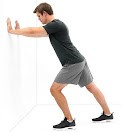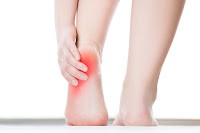- wellness@curaphysiotherapyclinic.com
Heel pain is a common foot condition. It's usually felt as an intense pain when using the affected heel.
The pain is often severe and occurs when you place weight on your heel.
The pain is usually worse first thing in the morning, or when you first take a step after a period of inactivity. Walking usually improves the pain, but it often gets worse again after walking or standing for a long time.
Some people may limp or develop an abnormal walking style as they try to avoid placing weight on the affected heel.
Most cases of heel pain are caused when a band of tissue in the foot, known as the plantar fascia, becomes damaged and thickens.
The plantar fascia is a tough and flexible band of tissue that runs under the sole of the foot. It connects the heel bone with the bones of the foot, and acts as a kind of shock absorber to the foot.

Sudden damage, or damage that occurs over many months or years, can cause tiny tears (microtears) to develop inside the tissue of the plantar fascia. This can cause the plantar fascia to thicken, resulting in heel pain.
There are several ways to prevent heel pain. Here are some tips that might help:
1. Wear proper footwear: Use shoes that have good arch support and cushioning. Avoid high-heeled shoes or those with thin soles that don't provide adequate support for your feet.

2. Stretch your calves and feet: Stretching helps to loosen tight muscles and tendons, which can contribute to heel pain. Keep your feet and calves flexible by regularly doing stretches and exercises specifically designed for these areas.

3. Maintain a healthy weight: Excess weight puts additional pressure on your feet and can lead to heel pain. Maintaining a healthy weight through exercise and proper diet can help prevent this.

4. Rest your feet: Overuse and repetitive stress can lead to heel pain. Take breaks during the day to rest your feet, and avoid activities that cause too much strain on your heels.

5. Seek physiotherapist’s attention: If you are experiencing persistent heel pain, consult a physiotherapist. They can diagnose the underlying cause of your pain and recommend appropriate treatment options. Matrix rhythm therapy, Ultrasonic therapy, kinesiology taping along with strength and flexibility exercises are proven to be very effective in treatments of heel pain.




